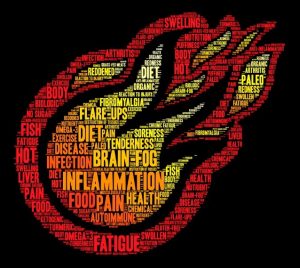Are Low Carb Diets Healthy Long Term?
Author: Dr. Stephen Chaney
 Inflammation is a bit like Dr. Jekyll and Mr. Hyde. Acute inflammation plays a valuable role in our immune response. But chronic inflammation is a scourge. Chronic inflammation:
Inflammation is a bit like Dr. Jekyll and Mr. Hyde. Acute inflammation plays a valuable role in our immune response. But chronic inflammation is a scourge. Chronic inflammation:
- Is a key component of all the “itis” diseases.
- Can lead to autoimmune diseases.
- Is thought to play an important role in heart disease.
- Is associated with many other diseases, such as diabetes, cancer, Alzheimer’s disease, and inflammatory bowel diseases (IBS).
While there are many causes of chronic inflammation, diet plays an important role. In a previous issue of “Health Tips From the Professor” I have described how an anti-inflammatory diet can quell the fires of chronic inflammation.
Fiber from unprocessed plant foods is a key component of an anti-inflammatory diet. But are all plant fibers equally effective at reducing inflammation? Here is what we know:
- Fiber from whole grains, vegetables, and fruits have different chemical and physical characteristics and support the growth of different species of friendly bacteria in our intestines.
- Previous studies have shown that higher intakes of dietary fiber are associated with lower risk of heart disease.
-
- Studies have suggested that fiber from whole grains may be more effective than fiber from fruits and vegetables at reducing heart disease risk.
- Chronic inflammation is highly associated with the development of heart disease. This has led to the hypothesis that fiber from whole grains may be more effective than other plant fibers at reducing chronic inflammation.
-
- Some studies have supported this hypothesis, but they have all been done with middle-aged participants, not with elderly participants who characteristically have higher levels of inflammation.
The study (R Shivakoti et al, JAMA Network Open, 5(3): e225012, 2022) I will describe today was designed to:
- Test the hypothesis that whole grain fiber is more effective than vegetable or fruit fiber at reducing inflammation.
- Determine how important reducing inflammation is at reducing the risk of heart disease.
- Extending these findings to an older population group.
How Was The Study Done?
 The data for this study was obtained from the Cardiovascular Health Study (CHS), a study designed to characterize factors influencing cardiovascular health in American adults aged 65 years or older. This study analyzed data from 4,125 participants (40% men, 95% white) who enrolled in the CHS study from 1989 to 1990.
The data for this study was obtained from the Cardiovascular Health Study (CHS), a study designed to characterize factors influencing cardiovascular health in American adults aged 65 years or older. This study analyzed data from 4,125 participants (40% men, 95% white) who enrolled in the CHS study from 1989 to 1990.
These participants did not have heart disease at the time they were enrolled in the study. They had an average age of 72.6 at the beginning of the study and were followed for an average of 11.9 years. During that time 1,941 (47%) of them developed heart disease.
When the participants were enrolled in the study:
- A food frequency questionnaire was administered to them by a trained dietitian to assess their long-term usual dietary intake. This information was used to assess:
-
- Their total fiber intake and…
-
- Their fiber intake from various dietary sources (whole grains, vegetables, and fruits).
- Fasting blood samples were collected and used to analyze various markers of inflammation.
A follow-up via phone was conducted every 6 months to track an initial diagnosis of cardiovascular disease.
At the end of the study, the investigators analyzed:
- The effect of total fiber and fiber from different food sources on the risk of developing heart disease.
- The effect of total fiber and fiber from different food sources on inflammatory markers in the blood.
- The extent to which decreased inflammation could explain the effect of whole grain fiber on reducing heart disease.
Do Whole Grains Reduce Inflammation?
- Increased intake of total fiber was associated with healthier levels of the inflammatory markers CRP, IL-1RA, and sCD163.
-
- Increased intake of fiber from whole grains was associated with healthier levels of the inflammatory markers CRP, IL-6, and IL-1RA.
-
- Increased intake of vegetable fiber was not significantly associated with healthier levels of any inflammatory marker.
-
- Increased intake of fiber from fruits was associated with healthier levels of the inflammatory marker sCD163.
With respect to cardiovascular disease:
- Every 5g/day increase in total fiber decreased the risk of heart disease by 5%.
-
- Every 5g/day increase in fiber from whole grains decreased the risk of heart disease by 14%.
-
- Increased intake of fiber from vegetables and fruits did not have a statistically significant effect on the risk of heart disease.
Finally, when the investigators did a statistical analysis to determine to extent to which the effect of whole grain fiber on inflammation, could explain its effect on heart disease, they concluded:
- The effect of whole grain fiber on inflammation could explain only about 16% of its effect on heart disease.
In the words of the authors, “In this prospective study of older adults, higher intakes of total fiber were associated with lower levels of various inflammatory markers, and this inverse association was primarily due to cereal fiber intake. Vegetable and fruit fiber intakes were not consistently associated with lower levels of inflammatory markers. These results suggest that specifically cereal fibers might be more effective in reducing systemic infection, which will need to be tested in interventional studies of specific populations.
In addition, cereal fiber was associated with a lower risk of CVD, although inflammation mediated less than 20% of the observed inverse association between cereal fiber and CVD. This suggests that the association of cereal fiber is primarily due to factors … other than systemic inflammation.”
Note: This conclusion underplays the role of fruit fiber in reducing inflammation. The statement is correct in saying only whole grain fiber reduces the inflammatory markers CRP, IL-6, and IL-1RA. However, both total fiber and fruit fiber increase the anti-inflammatory marker sCD163. That is why I chose to use the term “healthier levels” rather than lower or higher levels when describing the effects of whole grain and fruit fibers on markers of inflammation.
What Does This Study Mean For You?
 #1: The biggest takeaway from this study is that whole grains are good for you.
#1: The biggest takeaway from this study is that whole grains are good for you.
- This study shows that whole grain fiber decreases our risk of developing heart disease.
-
- This is fully consistent with multiple previous studies showing that whole grains decrease the risk of heart disease.
- This study also suggests that whole grain fiber reduces chronic inflammation.
There are also some takeaways from this and previous studies that may not be so obvious.
#2: Fiber has many important benefits beyond its effect on inflammation. For example:
- This study concluded that the reduction in inflammation only explained a small part of the beneficial effect of whole grain fiber on reducing heart disease risk.
- That is because whole grain fiber also:
-
- Feeds friendly bacteria that improve gut function.
-
- Provides satiety that can result in reduced fat and calorie intake.
-
- Binds cholesterol, which improves blood cholesterol level.
-
- Slows the rate at which dietary sugar enters the bloodstream, which improves blood sugar control.
#3: Whole plant foods have many benefits beyond their fiber content.
- This study concluded that whole grain fiber was more beneficial than fiber from fruits and vegetables at reducing inflammation and reducing the risk of heart disease.
- However, we know that fresh fruits and vegetables are an essential part of an anti-inflammatory diet .
- Previous studies have also shown that fruit and vegetables significantly decrease the risk of heart disease, stroke, and cancer.
- That is because whole grains and unprocessed fruits and vegetables:
-
- Displace sugar, refined flour, and highly processed foods from the diet.
-
- Have a lower caloric density than processed foods, making it easier to achieve a healthy weight.
-
- Provide nutrients and phytonutrients not found in processed foods.
-
- Support a wide variety of healthy gut bacteria.
Are Low Carb Diets Healthy Long Term?

 When you consider all the benefits of whole grains, fresh fruits, and vegetables, it brings us to the final take home message.
When you consider all the benefits of whole grains, fresh fruits, and vegetables, it brings us to the final take home message.
#4: Despite what Dr. Strangelove has told you, low-carb diets may not be healthy long term.
- There are no long-term (10 or 20-year) studies of low-carb diets. We simply have no evidence to support the claim that they are healthy long term.
- Most low-carb diets eliminate or severely limit fruits and whole grains. Considering the many health benefits they provide, it is unlikely that any diet that restricts them is healthy long term.
The Bottom Line
A recent study looked at the effect of plant fiber on inflammation and on heart disease.
With respect to inflammation the study found:
- Increased intake of total fiber was associated with healthier levels of the inflammatory markers CRP, IL-1RA, and sCD163.
-
- Increased intake of fiber from whole grains was associated with healthier levels of the inflammatory markers CRP, IL-6, and IL-1RA.
-
- Increased intake of vegetable fiber was not significantly associated with healthier levels of any inflammatory marker.
-
- Increased intake of fiber from fruits was associated with healthier levels of the inflammatory marker sCD163.
With respect to cardiovascular disease:
- Every 5g/day increase in total fiber decreased the risk of heart disease by 5%.
- Every 5g/day increase in fiber from whole grains decreased the risk of heart disease by 14%.
-
- The biggest takeaway from this study is that whole grains are good for you.
Other takeaways from this and previous studies are:
2) Fiber has many important benefits beyond its effect on inflammation.
3) Whole plant foods have many benefits beyond their fiber content.
4) Despite what Dr. Strangelove has told you, low-carb diets may not be healthy long term.
For more details on this study and what it means for you, read the article above.
These statements have not been evaluated by the Food and Drug Administration. This information is not intended to diagnose, treat, cure or prevent any disease.







